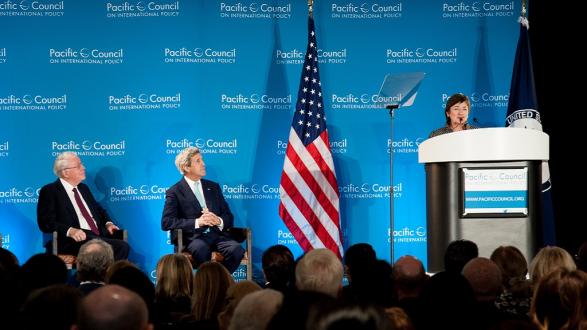In:
As 2016 comes to an end, the Pacific Council has much to be proud of both as an organization and as a community of individuals who are passionate about global affairs.
We also know there is much that remains to be done.
This year, we witnessed the tragedy in Syria get worse at the expense of its most vulnerable citizens; global terror shook the western world with attacks in France, Belgium, and elsewhere; and Colombia finalized a landmark (but contentious) peace deal. World leaders faced a deepening migrant crisis, the global threat of a Zika pandemic, and new political trends that had previously seemed unimaginable. We saw decades-old tensions diminish as President Obama became the first sitting U.S. president to visit Cuba in over 85 years. And we watched as a divisive American presidential race and the Brexit vote in the U.K. projected an unpredictable future onto the global stage.
As we look ahead, we see a Pacific Council poised for greater impact and growth.
Meanwhile, the Pacific Council continued to evolve as an organization. We successfully worked to break the status quo by investing in inclusivity and supporting underrepresented voices. In 2016, we elected our first-ever member class with a majority of women, and we hosted our first Members Weekend conference without a single all-male panel.
We also improved our digital sophistication and reach, expanding our web platform to provide up-to-date news and ideas from the Council, livestream video of some of our most important events, and connect members around the world. Members Weekend brought with it a new mobile app with real-time participant polling, agenda-setting, feedback, and messaging abilities.
Throughout the year, our members continued to put their expertise into action: the Guantánamo Bay Task Force released a report of its recommendations in February; members in Seattle, San Francisco, Silicon Valley, and Los Angeles helped develop our new water scarcity project over six months with support from the Hilton Foundation; and in recent weeks, experts weighed in on the next administration’s foreign policy agenda in the First 100 Days series.
We also welcomed prominent leaders with diverse policy orientations to provide insights into our changing world. Secretary of State John Kerry and Secretary of Commerce Penny Pritzker addressed the current backlash against free trade. U.S. Ambassador Roberta Jacobson and Mexican Ambassador Carlos Sada discussed the U.S.-Mexico relationship and its connection to damaging campaign rhetoric. We also heard from CIA Director John Brennan, Peace Corps Director Carrie Hessler-Radelet, former President of Ireland Mary Robinson, Navy Secretary Ray Mabus, former Afghanistan, Iraq, and UN Ambassador Zalmay Khalilzad, former National Security Advisor Stephen Hadley, and numerous other thinkers and doers who shape our world.
We will continue to work hard to educate and raise the level of debate in what is certain to be a challenging, exciting year ahead in global affairs.
Abroad, our member delegations traveled to Kazakhstan and Uzbekistan. Here at home, Pacific Council delegations met top tech industry leaders in Silicon Valley, talked to security, military, and Asia experts during a visit to the U.S. Pacific Command in Honolulu, visited the naval base at Point Loma in San Diego, and participated in an embark on the U.S.S. Carl Vinson aircraft carrier at sea.
As we look ahead, we see a Pacific Council poised for greater impact and growth. In 2017, we will advance our water scarcity project and our Mexico Initiative. We will host a special "State of the Global City" address with Mayor Eric Garcetti, supported by the RM Liu Foundation, and a half-day "SeouLA" conference in partnership with the Korea Foundation. Members will lead international delegations to Doha, Abu Dhabi, Brussels, The Hague, and Mexico City.
If you have not already, please consider making a donation to support these and other important programs in 2017. Your support makes our work possible.
We will continue to work hard to educate and raise the level of debate in what is certain to be a challenging, exciting year ahead in global affairs.
____________________
Dr. Jerrold D. Green is the president and CEO of the Pacific Council on International Policy.




